Ian Mathie, a frequent commenter here, an infrequent Skype friend, and a constant source of encouragement and really bad email jokes, has died. We are awaiting an official statement from his family; all I know currently is that he died on Tuesday, May 30.
I know there will be opportunities to remember him as the weeks move on. For now, I can think of no better tribute than to repost this guest blog he did for me back in the early years of And So It Goes.
Here is that post, from July 16, 2014. (I’ve linked to it if you’d like to see the Comments).
The Richness of Cross Cultural Experience – Ten Lessons One Learns
My guest today is Ian Mathie. I first met Ian just a little over a year ago on Belinda Nichol’s blog, My Rite of Passage. I was struck immediately by this sentence of his:
“But there are stories about people and cultures that, if they are not recorded, might be lost to the rest of the world—people who deserve to be remembered, histories that should not be sacrificed in the name of progress.”
Now here was my kind of memoirist.
Here’s his bio:
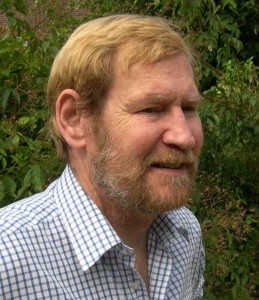
Born in Scotland, Ian was taken to Africa when he was three and began his schooling in a mission school, with lessons in the morning and the African bush as his playground in the afternoon.
Growing up with Africa enabled him to absorb the culture from within, so on returning to Africa after secondary school and military service, to work as a rural development officer, he adapted very quickly to life alone in the bush.
Working primarily on water projects, he has worked in almost every African country, spending thirty years there before returning to Europe and retraining as an industrial psychologist. (He insists there’s a logic to that).
When a medical condition curtailed his travelling he settled down to write books and has so far produced six volumes of African Memoirs, one novel and one small book of poetry. He now lives in a small village in the UK with his wife and dog.
Ian has five memoirs from his many years living among the various cultures and nations of Africa: Bride Price, Man In a Mud Hut, Supper With the President, Dust of the Danakel, and Sorcerers and Orange Peel. I’ve started at the beginning, with Bride Price — action packed, yet with fully-fleshed out characters that I’ve come to know and enjoy — and hope to wind my way through the rest of them over the summer.
AND, he welcomes feedback from readers.
WELCOME, Ian. And thank you for the photos that intersperse your story.
****
The Richness of Cross Cultural Experience — Ten Lessons One Learns
Growing up in the African bush meant that when I returned after my education was completed and I’d done four years military service, I had no trouble settling to life in isolated villages as a rural development officer. Learning the local languages only took a few months, and before long I reached the point where I could discuss matters of cultural interest, beliefs and so on, as well as those issues concerned with the job.
As part of the government’s overseas aid programme, I was to oversee a number of existing projects, and initiate new ones according to a loosely written brief. It soon became apparent that the brief bore little relation to the actual needs to the recipients, and telling them what they needed was not a good approach.
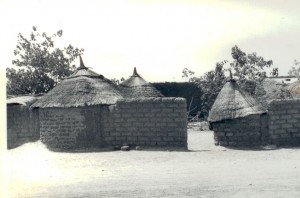
An old man who had never been to school, who could neither read nor write, but who had command of six different languages, and several dialects of each, pointed out that I was equipped with two eyes, two ears and one mouth. It would serve me well, and everyone else, for that matter, if I used them in those proportions. Fortunately I had the sense to listen, and it was one of the most valuable lessons I ever learned.
Soon afterwards I met an old Belgian missionary, a Catholic priest who had come to West Africa over thirty-five years before, with the instruction to convert the heathen and bring them into the fold. On his arrival, Father Bernhardt found that the people in his new parish were destitute. Their farms were meagre and unproductive, and they were all hungry for food, not spiritual guidance. Their own shamans and spiritual men were clearly powerless to change this situation, so he decided that nourishing their bodies was necessary before he could counsel their spirits.
He started a farm school, and taught then to grow good food. He got help teaching the women about nutrition and hygiene; and as he worked with them he learned about their ways, beliefs, and culture. Every Sunday he went to the small church his predecessor had built, it was little more than a cabin, and said mass. In time, the two or three people still living there who had accepted instruction from the previous priest came to join him.
After two years the farm school was going well, and he feltit was time to begin his primary mission. He invited all who were willing to help to come and make bricks with him, as he intended to build a church. On every brick the name of the person who made it was inscribed. Since most could not write, he taught them, and before long the brick makers were writing their own names on their bricks. Soon their children wanted to join in, so he taught them as well. Long before the rains came, he started work on building his church.
During all the time they had been making bricks, Father Bernhardt talked to the workers about God and his teachings, relating what he said to their own beliefs and spirits. When the first part of the church was finished several dozen came to listen when he said mass the next Sunday morning. By the time I met him his regular congregation had grown to over three hundred and fifty.
I learned from many events and many people all over Africa, but these two stand out because they were early in my working years, and greatly influenced my thinking. My whole approach to the job was transformed and developed a consumer focus. It was evident that people generally knew what they needed, and certainly knew what they wanted. If I tried to foist something else on them it would be abandoned the moment my back was turned. So I exploited their wishes, and became a catalyst to help them achieve what they most needed. This, in the early days, invariably revolved around their water supply, which was often precarious.
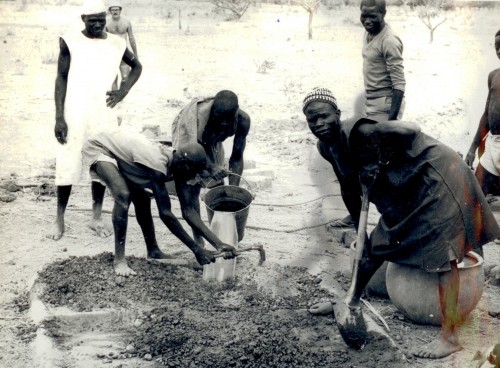
I had access to all sorts of gadgets for finding water and for working out how deep below ground it was. But it seemed wiser to let their own diviners identify these places, and merely to confirm them with my instruments. Then, if the water was either deeper than predicted, or less plentiful, they couldn’t just abandon the well and say it was my fault there was no water. When they had chosen the site themselves, people always worked more willingly and more enthusiastically. They would keep digging until they found water. On one well in Togo this took us to a depth of 72 metres! But we found good water, and that well is still in use today, forty-two years later.
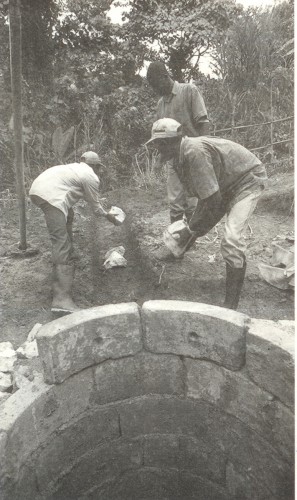
Tribal Africans do not separate spiritual life from the mundane physical daily grind. When people die, even though their bodies decay, they do not depart, but remain present as ancestors, who should be consulted whenever decisions are made. Shamans, sorcerers and witch doctors provide the interface between the physical and the spiritual worlds through which this can be done.
They also serve to speak with and propitiate all the other spirits and gods that inhabit the world and which influence the people’s daily lives. Their contribution is often essential for any project to succeed. Whilst there are undoubtedly some who are in it for their own benefit, they can exert an inordinate influence over people’s attitudes and willingness to contribute and participate. So offend them at your peril; sometimes literally, as the use of poisons, let alone magic spells, is far from uncommon.
As well as practical and working lessons, I discovered an extraordinary wealth of interest and wisdom in the varied cultures of people in the bush. They inhabited very different environments, from the searing heat of the desert; through broad, grazing savannahs; to rich cultivated parkland, growing grains, groundnuts and sugar cane; mountains, where two crops a year could be harvested as long as the monsoons didn’t fail; and deep tropical forests, whose people harvested the jungle’s bounty whilst living in a permanently soggy, dimly lit environment. There were exciting cultures, with tremendous diversity of beliefs, customs and traditions. Living alongside these and being allowed to participate, and even, on occasions, being initiated into their fold, was a rare privilege that offered a level of understanding not available to most outsiders, or to tourists.
These experiences, and many of the wonderful people I met, now fuel my writing. Since truth can so often be stranger than fiction, and Africa offers such variety of extraordinary truths, I have discovered that telling their stories in memoirs can make gripping reading, every bit as exciting as any novel. And it has the advantage that I don’t have to make anything up.
The old adage says you can only get out of life what you put into it, is most emphatically true. Being willing to meet others in an open, friendly and co-operative way is essential; and to understand that you can only achieve things through your own efforts.
Africa thrives on proverbs. The first I ever learned has lasted me a lifetime and proved itself time and time again. So I’ll offer it to you now: Kila ndege hurukwa kwa bawa lake – Every bird must fly on its own wings. Think about it, and then stretch out your own wings.
The lessons:
- Look and listen more than talk
- Exploit people’s desires
- Let people choose; then they won’t give up
- Put ideas in contexts people understand and value
- Learn the system and get involved
- Use the local talent (including the sorcerers!)
- Choose your timing carefully
- Always be open, friendly, and co-operative
- Let people fly on their own wings
- Always be positive and avoid “don’ts”
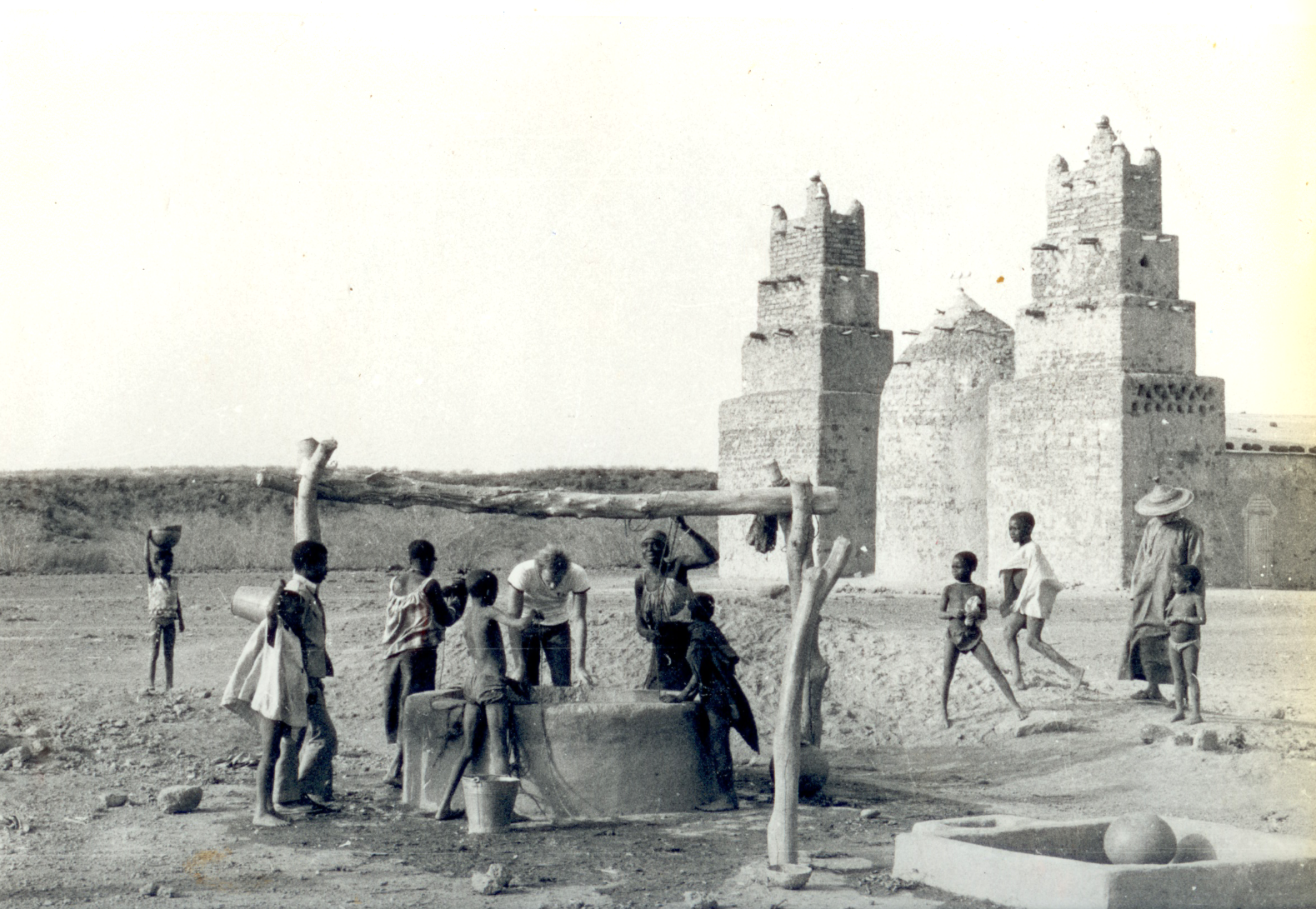
Thank you, Ian. There are so many avenues to persue in what you have written.
I love how you’ve summed up your experience with these ten lessons that we can all pay attention to. I particularly like “Exploit people’s desires.” And I love that you’ve used a word, exploit, which we ordinarily think of as perjorative, in a very positive way; to describe, quite aptly I think, just what it is you’re doing: making the most of their energy around what it is they already want. To do that you have to listen. That is just what the Peace Corps is about as well.
To do that, it seems to me, we have to let go of that “my way is the right way” mentality that pervades so much of any culture. And that’s not always easy to do.
How about you? How hard would it be, or has it been, to give up your way of doing things, to try on a different way of being in the world? Have you found it exhilarating or quite frightening? Both? Or something in the murky middle? Do tell us your story.
Ian has graciously offered an eBook copy of any of his books to one of our Commenters (Drawing on Sunday). And, he’ll offer a free paperback if you’ll go to England and pick it up.

Sharon Lippincott
Thank you for reposting this piece Janet. I think I missed it the first time around, and what a fitting tribute to a man who leaves huge heart prints among us. His own words seem to best describe our current situation: ” When people die, even though their bodies decay, they do not depart, but remain present as ancestors, who should be consulted whenever decisions are made.” Since in America we lack shamans and such as interfaces, his wisdom and spirit will live on in words like you share here and in his incredible books.
I hope you’ve read all the books by now. Each is a gift. May they continue to thrive and inspire!
Janet Givens
I’ve picked up Man in a Mud Hut again. I thought I’d go through the whole series this month. Thanks for adding your thoughts here, Sharon, and for posting to NAMW
Carolyn
A fine tribute to a good, funny and kind man
Janet Givens
Thank you Carolyn. He did have a grand sense of humor, when he wasn’t priding himself on his contrariness.
Merril Smith
It was sad to hear this news, Janet. He always seemed to take the time to give you thoughtful responses to your posts. I know you will miss him. This is a wonderful tribute.
Janet Givens
Thank you Merril. His was often the very first comment I’d get, since he was in England and I post at 3 am. If there was a comment from Ian, I knew my post had passed muster. And, I realized last week something was amiss, for I hadn’t heard from him since the O in FROG.
Kathleen Pooler
Thank you for this lovely tribute to Ian, Janet. It’s fitting that his own words enlighten us all as to the compassionate and generous person he was. Although I didn’t know him well, he didn’t hesitate to reach out to me to offer me comfort and counsel during my health challenges. He always offered such thoughtful and thought-provoking dialogue to any conversation. Oh my, how he will be missed. But his spirit will live on in his memoirs as well as in the hearts of all who have had the privilege of getting to know him. RIP, dear Ian.
Janet Givens
Kathy, you have summed up our loss perfectly. Thank you. He really was better than the last few, rather obstreperous comments he left. Something else was going on.
Susan Jackson
This is so sad. I only knew him from WLM but always enjoyed his post. I read Bride Price also, he will be missed.
Janet Givens
Yes he will. Thank you Susan.
Tim Fearnside
So sorry to hear this, Janet. I had noticed, too, that he hadn’t weighed in on your most recent post, since, as you noted above, he was always the first to do so. I wish I’d gotten to know him, as he was obviously a bright and interesting man with a wealth of knowledge and experience.
Janet Givens
Thank you, Tim.
Ian was a kind, generous and thoroughly engaging human being with a streak of the curmudgeon that I believe he was quite proud of. He often, I think, rather enjoyed playing the “odd man out.” Speak your mind, follow your heart … I can still hear him say. I too am sorry you didn’t get to know one another better.
Laurie Buchanan
Janet — I’m so sorry for the loss of this remarkable human being. Your tribute to Ian is beautiful.
Janet Givens
Thank you, Laurie. He had a powerful presence here
Lucinda E Clarke
Janet thank you so much for tagging me so I didn’t miss this post. It brought tears to my eyes, I still can’t believe how much you can miss someone you only knew on social media and email. Ian understood Africa, he understood the mindset of the people there far better than I have ever described it. He connected with the rural people. So many of us will miss him. Always first to comment on the blog, always there with an encouraging word, kind, helpful and incredibly modest abour his achievements some of which are not mentioned publicly. RIP Ian you will be mourned by hundreds of us.
Janet Givens
Lucinda, I’m so glad you found your way here. We all miss the same Ian. He was, among all his many attributes, consistent.
I miss the opportunity for this online community of his peeps to hold an online service in real time. It’s something I imagine will evolve over time.
Thank you for sharing your thoughts.
Trish Simpson-Davis
I’ve just discovered your blog …
Your readers might be interested to know that Ian Mathie’s last book, ‘Wild Child’ has just been published posthumously and is available on Amazon. As beautifully written as ever, it narrates Ian’s growing up as part of an Army family, living in Africa and Malaya and later on, sent ‘home’ to English boarding schools. It explains at last how he became the resourceful, resilient man of his later ‘African Memoirs’.
Kind regards
Trish
Janet Givens
Thank you Trish and welcome. I’m glad you found us and thank you for mentioning Ian’s new book, published posthumously obviously. I’m proud to say a print copy is sitting in my office, high up on my TBR pile. I’d like to ask how you came to know Ian? What is your connection? And can you answer the question that continues to haunt me: what happened to Mungo? Thanks.
Gay Mathie
Dear Janet
I found your blog today after a conversation with Trish. I cannot resist answering your enquiry about Mungo, our much loved family Labrador. Nothing has happened to him. At least, not yet. But he is now very ancient, fifteen and a half years old, and creaky. I am amazed he is still here, with me, as I fully expected him to do what many devoted pets do when their owners pass on, simply fold up and die too.Thank you for asking.
I am pleased you have a copy of Wild Child and I hope you enjoy it. Kind regards.
Janet Givens
Gay, hello and welcome. I’m am thrilled to have you join us here. Ian was an important part of my blogging world and his death hit us hard, personally for me as well as professionally. I came to look forward to his comment to each weekly post as it was the first to arrive and often got the conversation off to a sometimes rambunctious start. His death left a huge hole.
Thank you for the news of Mungo. I certainly knew Ian loved that dog. I’ll say more in an email. Again, thank you for stopping by and saying hello.